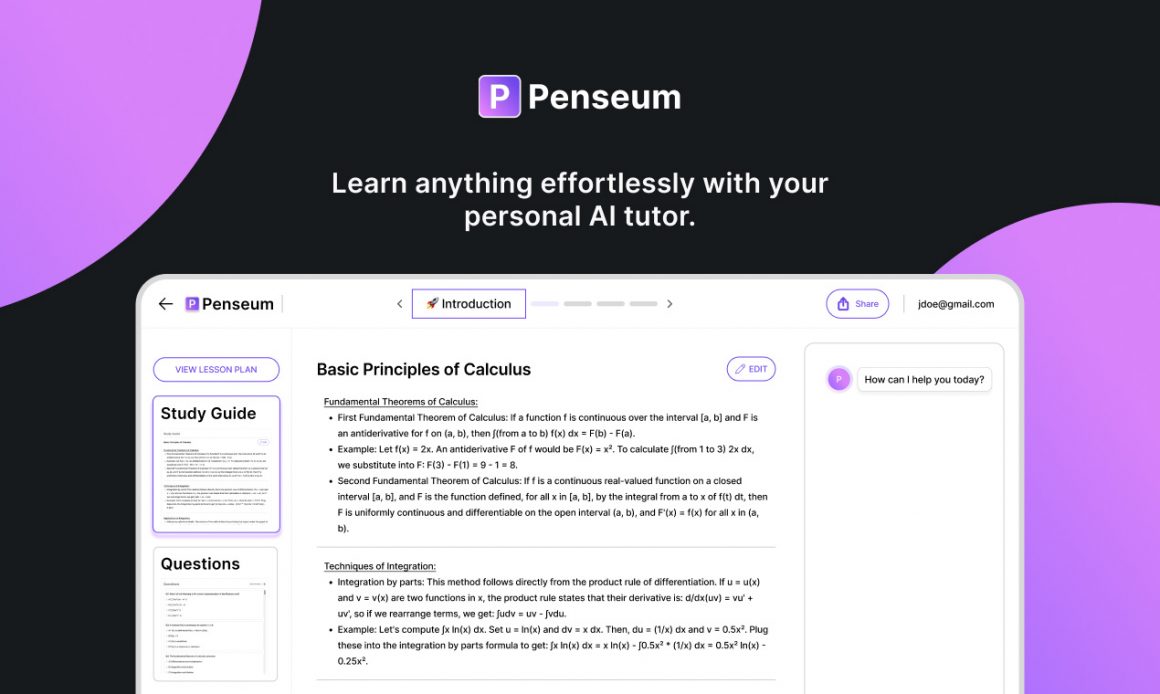
U of C alumni develops an AI tool designed to improve study habits
By Nazeefa Ahmed, September 25 2023—
Penseum is an AI tool that uses notes uploaded by students to generate concise study guides, multiple-choice questions and flashcards as well as provide information to a chatbot to answer questions about the topic of study.
“Penseum is an innovative study platform revolutionizing the way students learn. Our AI-powered tools provide personalized study guides, searchable study materials and an adaptive AI study assistant. Unlock your academic success with Penseum today,” read a statement from their Google landing page.
In two weeks, 240 users have registered on the app and are uploading materials to study for the upcoming midterm season.
In an interview with the Gauntlet, Penseum CEO Kamyar Hosseini described the science-based study techniques built into the app such as space repetition, interleaving, retrieval and elaboration.
“We have a cognitive psychologist on the team and advisors that help us tailor this platform to the actual needs and study methods that help students,” said Hosseini. ”Everything that we do on a platform is backed by science to make sure that everything we’re doing is not just what we think is right. It’s actually what has been proven to be right.”
Hosseini notes the key differences between Penseum and other language-based AI tools such as ChatGPT. Penseum generates study material directly from what is uploaded rather than the internet, which increases specificity and relevance for students. The small data set also avoids the risk of hallucination, which is the falsification of information to cater to a user’s question.
“We have tried to mitigate hallucination by building our artificial intelligence engine in such a way that it thinks in a step-by-step manner and is trained on the data that is most relevant to students,“ said Hosseini.
“We’ve used the idea of ChatGPT — how well it speaks English, how good it is at taking a method and essentially compressing, summarizing or telling the story a different way — and we apply it to the information that you have,” said Hosseini. “On top of that, we are fine-tuning our model so that it is essentially built to be an assistant for students.”
Pouria Shahbazi, CMO and U of C economics graduate discusses the benefits of the Penseum chatbot compared to ChatGPT and search engines, as it answers questions directly from the source material.
“As a student who just recently graduated, one issue that I ran into was how ChatGPT couldn’t get into specifics,” said Shahbazi. “It also takes stuff from the Internet which wasn’t really what I was looking for. So what we’re trying to do is make it as personalized and as specific as possible for students.”
The platform is currently free and only requires an email address to register, but premium options may become available in the future.
Any material uploaded to a personal Penseum account is for the user and is not shared with anyone. Parsa Honarmand, CTO and U of C computer science graduate speaks of a future update that will allow students to share their notes or AI-generated material and create an online hub for learners taking the same course.
“In the upcoming versions, we want to include a community aspect to our app where people can share their notes with other people,” said Honarmand. “It would most likely be the study guides for the questions that they are using instead of the notes they directly uploaded.”
Honarmand also confirmed that Penseum keeps its users’ information secure and that they do not sell or share customer data. He also discussed the positive feedback they received from users.
“We got very positive in terms of everyone since people were excited to have such a tool,” said Parsa. “They like the idea that everything was in one place and they could chat to our chatbot with their own data. They also liked the fact that instead of sitting down and writing their own questions or flashcards, everything was kind of automated for them in a matter of seconds or minutes.“
Hosseini concluded by discussing some of the foundational goals of the organization — to make education accessible by removing the barriers.
“This is meant to have a socioeconomic impact, open closed doors and provide fair and quality education for everyone that’s out there,” said Hosseini. “We wanted to create this platform and for us to be the medium that is going to bring the world closer together in terms of education, where we can all grow together rather than some of us having privileges, and others not so much.”
Penseum is available online and students can register their account on the company’s website.
